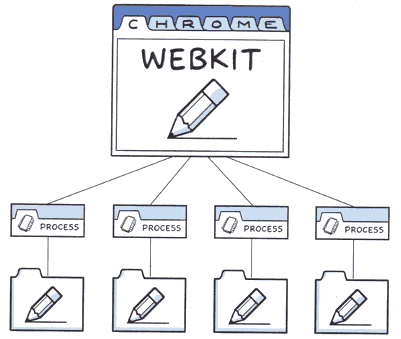Is Google Chrome an IE/Firefox/Opera/Safari killer?

So, it would appear that Google has plans to shake up the browser ecosystem by releasing an open source browser of its own. What does this mean for the other browsers.
Based on a comic book (yes, you read that right, a comic book) sent out to the Google Blogoscopedblog, the Google Chrome browser will be:
- Open source, built from scratch
- Make use of a JavaScript virtual machine called V8
- Support multiple processes so each tab runs in isolation so bugs and slow-downs only hit a single tab (creating what's called in the comic book a "sad tab") rather than bring the browser crashing down
- Revolutionary use of tabs (the tabs will be at the top of the window rather than below the address bar
- Incognito mode that kinda sounds like Internet Explorer's InPrivate mode
- Make use of WebKit open source rendering engine
- Plugins removed from the rendering process and placed in a separate process
- Web app support
- Whiz-bang address bar called "Omnibox"

Note: I really like the idea of tabs running in a separate process. It basically means that you can just keep on opening tabs without worrying that a single process will collapse under the weight of work and force me to close and then reload all the tabs I had open.
[poll id=343]
As expected, the comic book leaves a lot of blanks that need to be filled in, but we can take a few things for granted:
- Google never does anything "small"
- The browser market is finite, and even Microsoft is slowly realizing that its market share is vulnerable to slow erosion by open source
- Open source is enjoying growing popularity
What this means is that when Google does release this new browser then it has the potential to have quite a sudden and dramatic effect on the other players. But who's likely to be the main casualty of Google Chrome? Right now it's probably too early to put bets down, but my guess would be that Google's primary target will be Internet Explorer. After all, that's the browser with the largest market share and it's also the browser that's likely to look the worst when compared to Chrome (IE is slow, cumbersome, shaky, poor at following standards and perceived by many to be a security vulnerability). When it comes to ranking the browsers, apart from "it comes pre-installed on your system," IE has little else going for it.
Nut won't Google Chrome suffer the same drawbacks as other browsers in that a lot of the web is written with IE in mind and that sometimes these pages don't play nicely with a browser that isn't IE? Well, page 10 of the comic book seems to suggest that Google will use its knowledge of which sites are the most popular destinations on the web to make sure that Chrome works for those sites. That's an interesting approach to the standards wild west that IE has created. If popular websites work in Chrome then this will encourage users to continue to use it.
Is Google Chrome a IE killer (or for that matter Firefox/Opera/Safari killer)? I think that this depends on a number of factors. First off, what tangible features/benefits will it offer the end user? These have to go way beyond tabs running in separate processes and such intangibles and deliver real and compelling reasons for users to shift browsers. If Google can make Chrome a small download, make is no-fuss to install and make it so that people find it easy to use, and if Google can deliver on the promise of it being fast, reliable and secure, then we could see the other players having to scramble to knock together far better browsers than they've been shipping so far.
To many people (average users) Google is the internet (in much the same way that AOL was the internet for many a few years ago). That said, I think that Google has to deliver a lot more with Chrome that a mediocre browser with a Google logo plastered on it, especially if it is to win over the power users (these users are already probably not using IE). However, given that Google didn't just choose to release a rebranded version of Firefox is a good indication that Google is taking this project seriously.
Where does this leave Firefox? Well, Google has already reaffirmed its allegiance to Firefox, so I don't think that this news has any impact on the Google/Mozilla relationship.
This could be very interesting indeed.